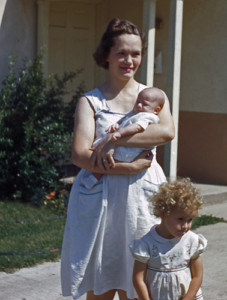
Josephine Webb holding Frank, w/ Susan Webb looking off-camera, Whittier, CA Aug 1945
By Susan Hess. Updated from original version published in the Hood River News in 2008.
Emma Josephine Parsons Webb, my mother, voted for the first time at age 40.
“The company transferred us from Oklahoma to Montana in June 1952,” she said. “For the November presidential election, we didn’t meet Montana’s six month residency requirement.”
She talked to the election authorities, and they told her she could vote by getting an absentee ballot from Oklahoma. “Since we no longer lived in Oklahoma, we certainly couldn’t vote absentee,” she says. By the next presidential election, the company had transferred the family again, first to Wyoming then to Colorado, which required a one year residency.
“I missed the time frame by three weeks.”
Four years later, in 1960, having met Colorado’s residency law, the state granted my mother the privilege of voting for the president of the United States.
My mother was born in Washington D.C. in July 1920. In August of that year, the 19th Amendment to the Constitution gave women — 144 years after our country’s founding — the right to vote. Eight million of them did in that November. Susan B. Anthony and Elizabeth Cady Stanton whose long fight brought it about, died before they themselves got to vote.
Oregon doesn’t require you to live in the state for a specific length of time in order to vote. Brian Beebe, Hood River County Clerk, says you just have to sign the registration form saying you live in Oregon.
For people today, life means: working, fixing meals, going to the children’s games and concerts, doing laundry, spending time with family and friends, volunteering, exercising, or just taking time to sit and stare at the wall. We want to be good citizens, but frequently studying the issues gets crunched in the few minutes before work: speed-reading the newspaper or gobbling ten minutes of radio or television news before bed.
“Some people say they don’t bother to vote, because their vote doesn’t count,” Josephine said. “Maybe one vote isn’t that important, but it’s still a right many people fought hard to achieve.”
For African Americans, the 13th Amendment abolished slavery, at last, in 1865. The 14th, in 1868 made them citizens and granted all equal protection of the law. The 15th, in 1879, made it illegal to deny any citizen the right to vote because of race or color or because he or she was a former slave.
Yet, many places in this democratic union, whose outstretched arms promised freedom to the world’s ‘huddled masses,’ devised ways to block African Americans from voting: poll taxes, literacy tests, and outright refusals to register them. Not until the Voting Rights Act of 1965, were the barriers finally broken. How many African Americans, whites, people of all colors paved the way to the Act with beatings, lynching, jail time, and their deaths, we’ll never know.
And yet, in the 2000 presidential election, The New York Times found that Florida ballots of African American and Hispanic voters, and those of people over 65 were twice as likely as ballots of whites to be rejected.
Asian-Americans fared no better. Chinese Americans were not allowed to become citizens until 1943. Japanese Americans and other Asian Americans had to wait until 1952. Only when they achieved citizenship could they vote.
Up until 1970, you could be drafted, join the military, perhaps be wounded or die fighting for your country at age 18, but you couldn’t vote till you turned 21. The 26th Amendment corrected that injustice.
Today ex-felons in some states cannot vote. May sound fair, but what one state considers a felony, another rules a minor infraction. And black males are disproportionately affected. They make up 35 percent of all Americans barred from voting.
It seems a shame not to vote and vote with gusto. So many people in the world never get the chance. “There’s a lot of political name-calling and lobbying, but at least our elections today are held without having military or police forces needed to protect citizens at the polling places,” my mother says.
Here in Oregon, we don’t even need to leave our homes; we vote by mail.
I don’t have the answer as to how we find time to really know the issues or candidates’ voting records. I think no matter how much we study, we never get all the information we need or want. We do our best; read what we can; go to whatever forums and candidate fairs we can.
I hate to nag people about this; I think we’re nagged at about enough things. My friend Scott says I am nagging.
I am.
This right is too precious not to use. It’s a gift from Susan B. Anthony; Martin Luther King; from all the people who marched, fought through the courts and congresses, stood in front of police dogs and fire hoses; and all the soldiers whose life blood drained out on battlefields, so we could lift that pencil and mark ‘x.’
According to the Hood River County Elections Website, Hood River County’s voter turnout varies from 26 percent in a special district election to 85 percent in the last presidential election. Turnout depends on how many candidates and issues are on the ballot, whether offices are contested or not, the level of publicity or controversy surrounding an issue or candidate, and whether an election concerns local, state or national issues.
The majority of the election turnouts don’t come near that 85 percent mark. The 2012 presidential election had an 85 percent voter turnout and at the time had 11,658 registered voters. Then, even in a big year such as the last presidential race 1,749 people that were registered did not vote. As of Oct. 3, 2016 there are 13,265 registered voters in Hood River County according to Mr. Beebe. If only 85 percent of them vote in the upcoming November election, that is almost 2,000 people not voting.
Why would 2,000 registered voters not vote?
It’s not only time that keeps people from voting: What possible difference does my one vote make in all the millions cast? One candidate is just like another. They make campaign promises and forget them when they get elected. They end up owing favors to whatever big corporation contributed the most money to their campaign. It doesn’t matter. In 2000, the majority voted for Gore, yet Bush became president. I dont care about the issues on this ballot. By the time people back east vote, the vote has already been decided.
It’s tough. It’s always been tough. When this country began, only white male landowners could vote. African Americans, women, Asian-Americans, and the young fought ignorance and prejudice. If you were one of them, it didn’t matter that you paid taxes, served in the military or lived here a life time.
Josephine Webb passed away in 2010. Once my mother got the right to vote, she never missed an election. Not one. “Doesn’t matter if it’s for governor or the school budget,” she said. “What if everyone stayed home? What would happen?”

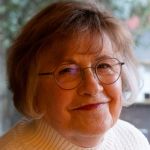

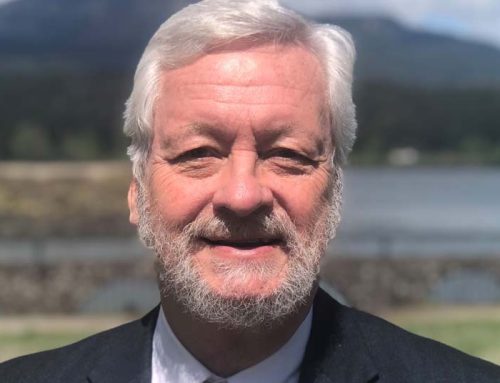
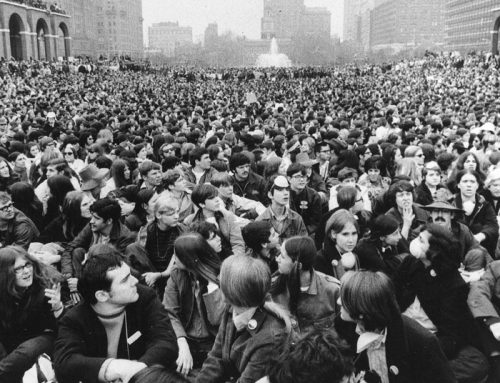
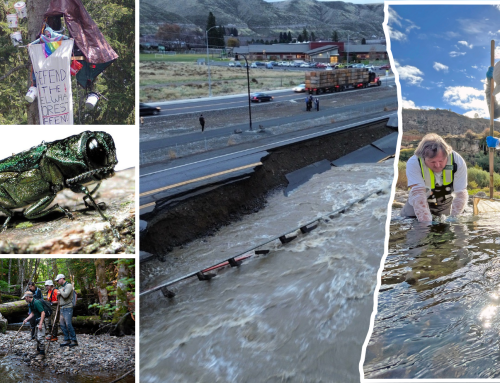

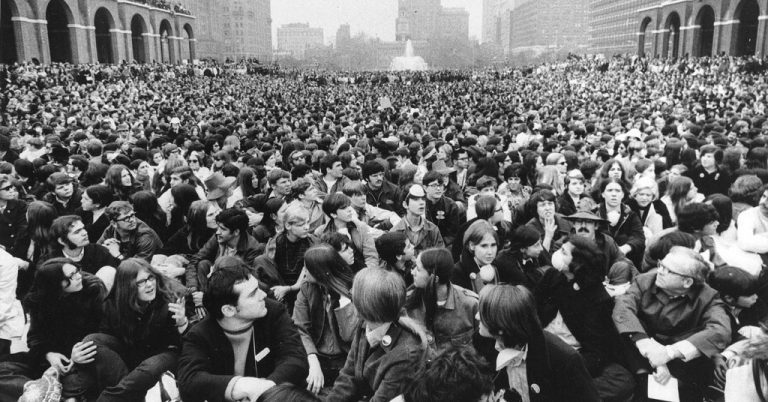

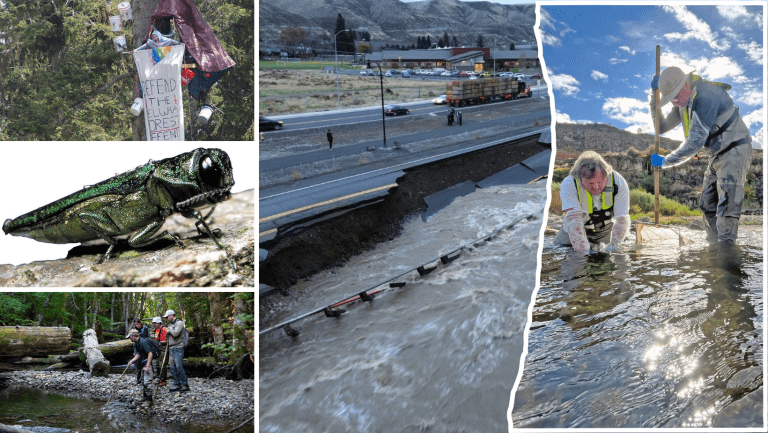


Thank you for rerunning this impassioned argument in for voting. It captures exactly why voting is no longer a privilege but a right.